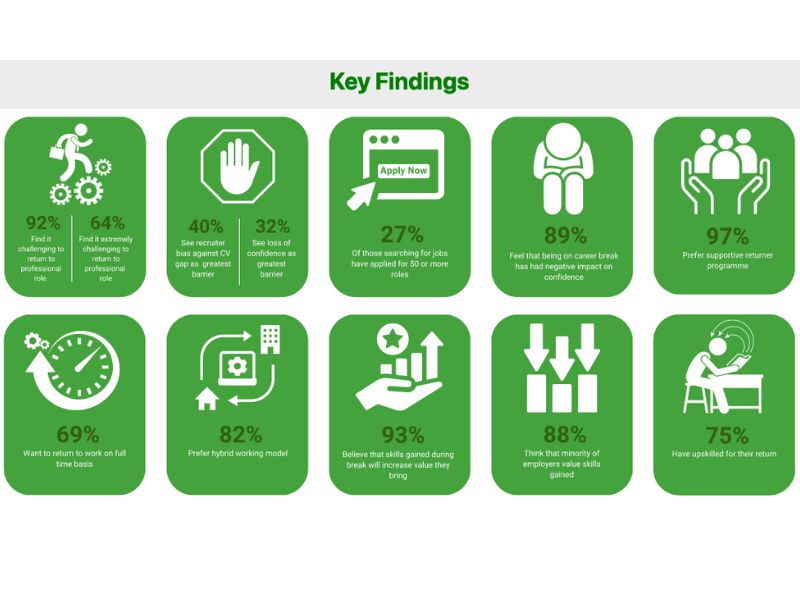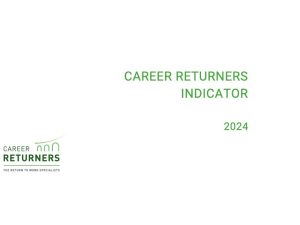 New research launches #EndTheCareerBreakPenalty Campaign to benefit employers, returners and the economy.
New research launches #EndTheCareerBreakPenalty Campaign to benefit employers, returners and the economy.
Pioneering return-to-work organisation, Career Returners, has conducted its first indicator research study, which shows that 92% of experienced professionals are finding it challenging to return to work after a long career break, with 64% saying it is extremely challenging.
Widespread recruitment bias against the CV gap is seen as the greatest barrier (by 40%), followed by loss of self-confidence (32%) and recruiter ageism (14%). Furthermore:
- Over 25% of those searching for jobs have applied for 50 or more roles
- 89% say that being on a career break has negatively impacted their self-confidence
- Even though 93% believe they have developed valuable transferable skills during their career break, few believe that employers value these skills

Respondents to the anonymous Career Returners Indicator research study (98% women, 73% on caring-related breaks) shared their frustrations:
“I’m an older mum and am coming up against multiple bias against CV gap, ageism, and being ‘too experienced’ for roles at a lower grade.”
“Recruiters like a cookie-cutter fit, the gap in the CV apparently washes years of experience away.”
“I’m a single mother with two disabled children. I need to earn money as the only provider.”
Off the back of the research, Career Returners today launches the #EndTheCareerBreakPenalty Campaign, calling on employers to review current recruitment practices, remove biases and support a high-calibre diverse talent pool. Its action plan ‘10 Steps to become a Returner Inclusive Employer’ lists practical actions that employers of any size can take.
Julianne Miles MBE, CEO and Co-Founder of Career Returners, and a Chartered Psychologist, comments:
“Our research findings show that the career break penalty is alive and kicking. We’ve been tackling these challenges for ten years and, while we know there’s no quick fix for this ingrained global problem, we have proven solutions.
“We’ve partnered with over 170 leading employers to create supported routes back to work and, as a result, thousands of returners are back thriving in skilled roles. But, as the research shows, we need to accelerate the pace of change. Far too many talented professionals are still being blocked from relaunching their careers hit by the double whammy of widespread recruiter bias against a CV gap and the loss of self-confidence.
“There is a false perception that skills disappear during a career break. In fact, we have strong evidence that the opposite is true. Employers who have hired returners say they bring a fresh perspective, maturity, enthusiasm, and a high degree of motivation. Returner programmes have shown that most returners will rapidly regain confidence and get back up to speed in a supportive environment.
“That’s why we’re launching the #EndTheCareerBreakPenalty campaign, to call on all employers to become inclusive of returners. This is the only way to harness the wealth of skills and experience that’s currently being wasted. This is not just about supporting a disadvantaged group – there are clear business benefits.”
Michelle Baggs, Head of HR at returner employer EDF explains:
“We’re always on the lookout for diverse talent so having a returners programme seemed a great addition to our current recruitment channels. Returners have amazing past work experiences with skills that are in short supply in the open recruitment market – this coupled with their enthusiasm and energy has made the investment very worthwhile.
“Career Returners provided us with all the support we needed to set up our programme and we’ve since received great feedback from the returners. We’re looking forward to building on this success with our Returners Programme 2024.”
The research study also illustrates that returners are ready and ambitious to relaunch their careers:
- It’s a myth that all returners want part-time work. Almost 70% want to work full time, although a degree of flexibility is key, with 80% preferring hybrid working – as one respondent says: “I have to believe that the best of me is yet to come.”
- Returners have upskilled for their return. Three-quarters have taken courses, half have undertaken skilled volunteering roles and the majority have done some smaller-scale form of paid work during their break
- Returning is about more than salary. Money is the main motivator for a third, while two-thirds are ambitious to regain the satisfaction, achievement and identity of professional work
- Returners are open to using their skills in new ways. A career pivot into a new role or sector, or a complete career change, is appealing to nearly 75% of returners
- Supportive returner programmes are preferred by 97%, with an equally split preference for a returnship versus supported hiring directly into a permanent role
Miles continues:
“I’m encouraged that returners today are largely optimistic that it is possible to resume their careers, despite the challenges they face, and that they see the skills they have developed during their career breaks as valuable to a future employer.
“As well as changing individual lives and improving the gender pay gap, the potential economic gains are enormous – in the UK alone, the PwC Women in Work Report 2024 estimated that even a 5% gain in the total number of women in employment could boost GDP by £125bn per annum.”
Returner commentary
Sarah Ellis had 14 years financial services experience prior to taking a 6-year caring-related career break, during which time she certified as a Pilates instructor. Sarah secured a role on the Handelsbanken’s UK Returners Programme in September 2023 and is now working as a private banking manager. Sarah comments on how her skills gained during her break positively impacted her return to the corporate world:
“What stood out is how much I had changed and matured. I found the social and networking side much easier than I thought I would and enjoyed it more than I ever had. The skills I learned from teaching Pilates to a crowd of people had changed me more than I had expected and gave me the confidence to present and express myself in a very different way. I was surprised at how much easier returning to work was compared to what I’d built up in my head.”
More employer commentary
Lyndsey Scott, Chief People Officer, DC Thomson comments:
“We began working with Career Returners to help us access a more diverse pool of skilled candidates and address recruitment gaps. At DC Thomson, we believe behaviours and potential are as important as skills and were impressed by the mindset and determination of the candidates we met.
“Career Returners’ guidance helped us develop a structured plan, ensuring support from mentors, coaches and managers throughout the programme, leading to successful placements, with 100% conversion rate from placement to permanent role and ongoing development for our returners. Career Returners has supported our goal of becoming a more diverse workplace.”
A full copy of The Career Returners Indicator 2024 can be downloaded. Career Returners plan to conduct this research annually to provide insights into the returners market for the purpose of informing their network, employer support and advocacy, together with decisions made by employers and government.
*Expert Advice from Career Returners: 10 Steps to become a returner-inclusive employer
- Learn about Returners. Listen to returner stories on the Career Returners Podcast. Challenge your stereotypes.
- Remove Screening Bias: Check that your automated or manual application process is NOT screening out candidates just because of their CV gap (a recent study found 43-48% of ATS systems filter out gaps over 6 months).
- Reduce Advertising Bias: Make sure your job adverts are only asking for ‘current/up-to-date knowledge’ or ‘recent experience’ if this is essential.
- Reduce Interview Bias: For competency-based interviews, adapt your questions to not ask for ‘recent work examples’. Focus technical interviews on skills rather than knowledge.
- Promote Returners as a Strong Candidate Pool: Put career returners on the radar for your recruiters and business leaders as a high-calibre and diverse talent pool. Educate on the full business case and ESG case for hiring returners.
- Support Returner Hires: Provide transition support for returner hires, such
as training, mentoring and (if you have the budget) Career Returners Coaching to help them to rebuild confidence and more rapidly re-integrate. - Provide Returner Training to Line Managers: Educate on hiring and supporting candidates returning from career breaks.
- Target Returner Applicants: Consider adding to job adverts ‘We welcome applications from candidates who have taken a career break’.
- [If larger] Run a Cohort Returner Programme: Use a proven framework to accelerate returner hiring and create a peer support network.
- Champion Returner Successes. Continue to break the bias using your real-life examples of successful returner hires.
Notes:
A total of 585 respondents took part in the Career Returners Indicator between November 2023 and January 2024.









